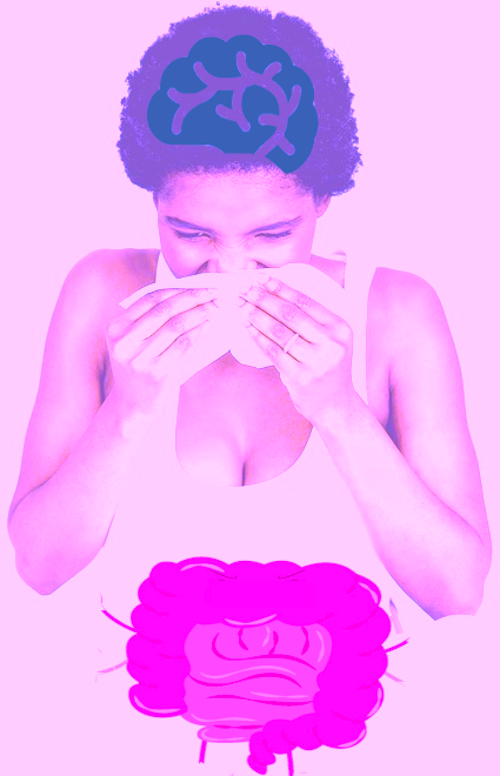|
|
Developmental Biology - Brain Link in Gut
Gut Link to Brain Disorders in Pregnancy
Women with inflammatory bowel disease (IBD) have increased risk for mental illness after giving birth...
New research shows women with IBD at increased risk for mental illness. With every 43 pregnancies, there is one case of mental illness in a woman with inflammatory bowel disease
A study published today in the journal Gut shows that women with inflammatory bowel disease (IBD) have an increased risk of developing a mental illness after giving birth compared to the overall population. The study used healthcare data on women who gave birth between 2002 and 2014 in Ontario, Canada to analyze the frequency of new mental illness diagnosis in women during and up to one year following a pregnancy.
Inflammatory bowel diseases, or IBD, are a group of chronic gastrointestinal disorders in which people have ulceration, inflammation, and bleeding of their gastrointestinal tract putting them at risk for complications in other parts of their body. The two main subtypes are Crohn's disease and ulcerative colitis. Likewise, people with IBD have an elevated risk for mental illness, especially anxiety and depression, potentially related to gut inflammation affecting their brain.
"There's increasing awareness about mental illness in women during pregnancy and postpartum. Because of the elevated risk of mental illness in people with IBD, we felt it was important to study if women with IBD were at greater risk of developing a new mental illness during pregnancy and after giving birth compared to the overall population. We found the risk to be elevated during the post-partum period for women with IBD, particularly in the first 90 days after birth. We did not find an elevated risk during pregnancy."
Eric Benchimol, senior author on the paper, and Senior Scientist at the CHEO Research Institute, Core Scientist at ICES, Associate Professor of Pediatrics and Epidemiology at the University of Ottawa, and a Pediatric Gastroenterologist at the CHEO Inflammatory Bowel Disease Centre.
In the study, pregnant women with IBD had: • an elevated 22.7 per cent risk of developing a new-onset mental illness postpartum as compared to women without IBD at a 20.4 per cent risk and • women with IBD were at increased risk of two out of four mental illness categories i.e. mood disorders (anxiety and depression) and substance abuse disorders (such as opioid dependency).
These women were primarily treated by doctors as outpatients, and did not need to be hospitalized. There was no evidence of increased risk for psychotic disorders (such as schizophrenia or hallucinations). However, the risk appeared elevated in women with Crohn's disease, and not for ulcerative colitis.
"There is a small but significantly increased risk of new-onset mental illness in women with IBD. Women with IBD face increased health challenges during pregnancy and after giving birth — and not just physical challenges. We need to look at both the physical and mental health needs of women and ensure they are getting the best treatment and support."
Simone Vigod, Chief, Department of Psychiatry, and lead author of the study, Scientist, Women's College Hospital Research Institute, and Adjunct Scientist at ICES."
"These findings are very important for both patients and healthcare providers in the IBD community. If a pregnant woman with IBD knows that there's an elevated risk of mental illness during the post-partum period, she should discuss this potential risk with her healthcare provider. It's important that healthcare providers are aware of this increased risk in women with IBD. Together, women and their healthcare providers can look for opportunities to prevent mental illness during pregnancy and after birth as well as identify and treat it earlier."
Mina Mawani, President & CEO, Crohn's and Colitis, Canada.
Abstract
Objective
Patients with inflammatory bowel disease (IBD) have an elevated risk of mental illness. We determined the incidence and correlates of new-onset mental illness associated with IBD during pregnancy and post partum.
Design
This cohort study using population-based health administrative data included all women with a singleton live birth in Ontario, Canada (2002–2014). The incidence of new-onset mental illness from conception to 1-year post partum was compared between 3721 women with and 798 908 without IBD, generating adjusted HRs (aHR). Logistic regression was used to identify correlates of new-onset mental illness in the IBD group.
Results
About 22.7% of women with IBD had new-onset mental illness versus 20.4% without, corresponding to incidence rates of 150.2 and 132.8 per 1000 patient-years (aHR 1.12, 95% CI 1.05 to 1.20), or one extra case of new-onset mental illness per 43 pregnant women with IBD. The risk was elevated in the post partum (aHR 1.20, 95% CI 1.09 to 1.31), but not during pregnancy, and for Crohn’s disease (aHR 1.12, 95% CI 1.02 to 1.23), but not ulcerative colitis. The risk was specifically elevated for a new-onset mood or anxiety disorder (aHR 1.14, 95% CI 1.04 to 1.26) and alcohol or substance use disorders (aHR 2.73, 95% CI 1.42 to 5.26). Predictors of a mental illness diagnosis were maternal age, delivery year, medical comorbidity, number of prenatal visits, family physician obstetrical care and infant mortality.
Conclusion
Women with IBD were at an increased risk of new-onset psychiatric diagnosis in the postpartum period, but not during pregnancy. Providers should look to increase opportunities for prevention, early identification and treatment accordingly.
Authors
Simone N Vigod, Paul Kurdyak, Hilary K. Brown, Geoffrey C. Nguyen, Laura E. Targownik, Cynthia H. Seow, M. Ellen Kuenzig, Eric I Benchimol.
Acknowledgements
About Women's College Hospital
For more than 100 years Women's College Hospital (WCH) has been developing revolutionary advances in healthcare. Today, WCH is a world leader in the health of women and Canada's leading, academic ambulatory hospital. A champion of equitable access, WCH advocates for the health of all women from diverse cultures and backgrounds and ensures their needs are reflected in the care they receive. It focuses on delivering innovative solutions that address Canada's most pressing issues related to population health, patient experience and system costs. The WCH Institute for Health System Solutions and Virtual Care (WIHV) is developing new, scalable models of care that deliver improved outcomes for patients and sustainable solutions for the health system as a whole.
Women's College Research Institute (WCRI) is tackling some of the greatest health challenges of our time. Its scientists are conducting global research that advances the health of women and improves healthcare options for all, and are then translating those discoveries to provide much-needed improvements in healthcare worldwide.
About ICES
ICES is an independent, non-profit research institute that uses population-based health information to produce knowledge on a broad range of health care issues. Our unbiased evidence provides measures of health system performance, a clearer understanding of the shifting health care needs of Ontarians, and a stimulus for discussion of practical solutions to optimize scarce resources. ICES knowledge is highly regarded in Canada and abroad, and is widely used by government, hospitals, planners, and practitioners to make decisions about care delivery and to develop policy. In October 2018, the institute formerly known as the Institute for Clinical Evaluative Sciences formally adopted the initialism ICES as its official name. For the latest ICES news, follow us on Twitter: @ICESOntario
The University of Ottawa - A crossroads of cultures and ideas
The University of Ottawa is home to over 50,000 students, faculty and staff, who live, work and study in both French and English. Our campus is a crossroads of cultures and ideas, where bold minds come together to inspire game-changing ideas. We are one of Canada's top 10 research universities - our professors and researchers explore new approaches to today's challenges. One of a handful of Canadian universities ranked among the top 200 in the world, we attract exceptional thinkers and welcome diverse perspectives from across the globe..
About the CHEO Research Institute
The CHEO Research Institute coordinates the research activities of CHEO and is affiliated with the University of Ottawa. Its three programs of research are molecular biomedicine, health information technology, and evidence to practice research. Key themes include cancer, diabetes, obesity, mental health, emergency medicine, musculoskeletal health, electronic health information and privacy, and genetics of rare disease. The CHEO Research Institute makes discoveries today for healthier kids tomorrow.
Return to top of page
|
|
Jan 10, 2019 Fetal Timeline Maternal Timeline News News Archive
 Pregnant women with IBD have an elevated risk of developing a new-onset mental illness postpartum as compared to women without IBD — 22.7 per cent compared to 20.4 per cent. The increased risk of two out of the four mental illness categories includes: mood disorders such as anxiety and depression; and, substance use disorders (such as opioid dependency). Image: MouseWorks
|
|



